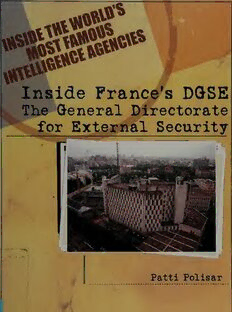Table Of ContentInside France's DQSE
The General Directorate
for External Security
Patti Polisar
BOSTON PUBLIC LIBRARY
Copley Square
Boston, MA 02116
V»'’
Inside France's DQSE
The General Directorate
for External Security
Patti Polisar
The Rosen Publishing Group, Inc,
New York
This book is dedicated to the ones I love,
and to the spirit of Daniei Pearl.
Published in 2003 by The Rosen Publishing Group, Inc.
29 East 21st Street, New York, NY 10010
Copyright © 2003 by The Rosen Publishing Group, Inc.
First Edition
All rights reserved. No part of this book may be reproduced in any form
without permission in writing from the publisher, except by a reviewer.
Library of Congress Cataloging-in-Publication Data
Polisar, Patti.
Inside France’s DGSE: The General Directorate for External Security
/ by Patti Polisar.
p. cm. — (Inside the world’s most famous intelligence agencies)
Summary: An introduction to the history, functions, and current
goals of France’s intelligence agency, the DGSE or Direction
generale de la securite exterieure.
Includes bibliographical references and index.
ISBN 0-8239-3814-X (lib. bdg.)
1. France. Direction generale de la securite exterieure—Juvenile
literature. 2. Intelligence service—France—History—Juvenile
literature. [1. Intelligence service—France—History.
2. Espionage—France—History. 3. Secret service—France.]
I. Title. II. Series.
JN2738.I58 P65 2002
327.1244—dc21
2002007365
Manufactured in the United States of America
Cover image: Site of “La Piscine,” the former headquarters of the
DGSE in Paris, France. In 2001, the DGSE moved its headquarters
to the fort of Noisy-le-Sec.
Contents
Introduction 4
Chapter One How the French Secret
Service Began 8
Chapter Two French Intelligence Today 17
Chapter Three Intelligence and the
Fall of France 24
Chapter Four The End of an Empire 36
Chapter Five France Looks Ahead 43
Glossary 53
For More Information 56
For Further Reading 59
Bibliography 60
Index 62
Introduction
E
spionage is a French word that describes the act of
uncovering the secret plans and activities of an enemy.
It was coined in 1793, during the reign of terror that
followed the overthrow of the monarchy, six years before
Napoleon Bonaparte declared himself emperor of France. The
term “espionage” includes spying on a country, an army, a
business, a person, or any other real or imagined enemy.
The information that spies gather is called intelligence.
Espionage and intelligence are controversial because they
involve secret activity. People worry that intelligence gath¬
ering threatens their rights to privacy.
There are different types of intelligence for different pur¬
poses. An army commander needs military intelligence to
try to predict enemy plans. A company president may want
to obtain a competitor’s secret designs to make a similar
product. The leader of a country needs a combination of
intelligence information to make knowledgeable decisions
about defending his or her country.
“National security” is a phrase we have heard often,
especially since the September 11, 2001, terrorist attacks
on the World Trade Center in New York City and the
Pentagon in Washington, D.C. It is the job of the people who
work for intelligence services to help protect their nation’s
security by investigating threats that might lead to these
kinds of attacks.
I
I iNl>AL^ School
I P^Ak Nj-obbs^:^
1
SehuToH Oj^schle
D^*’ SfiNATf Of^f^ice
°<^ILOIHe
Preventing biological attacks is now one of the main responsibilities of
intelligence agencies all over the world. This seeinmgly innocent-lookuig letter
was opened hi October 2001 in the office of II.S. Senate Majority Leader Tom
Daschle. Because it contained deadly Anthrav powder, nearly fifty staff inembers,
who may have been exposed to it, were treated with antibiotics.
The main responsibility of an intelligence agent is to
uncover information that will help a country’s leaders make
knowledgeable decisions about their defense policies.
People are motivated by different goals, so it is important to
understand an opponent well enough to predict his or her
actions. To do this, agents must find specific and accurate
answers to many questions. How powerful is the enemy?
When, where, and how might they strike? How would the
enemy respond in a given situation?
A threat to a country is the possibility that an enemy will
harm its people or way of life. An armed invasion, a hijack¬
ing, a kidnapping, or a bombing all pose risks to a nation’s
security. Nuclear weapons are powerful threats. Biological
attacks, such as the letters containing anthrax spores sent
Inside France's DGSE
to U.S. senators and handled by postal workers, are threats.
Whether a threat is real or imagined, as with several
anthrax false alarms, it is the job of intelligence agencies to
gather information and investigate the level of danger.
People who gather intelligence are called agents or
spies. Diplomats or other people whose jobs place them in
good positions to hear important information can also be
spies. By listening carefully to people who know details,
spies uncover what is called human intelligence (abbrevi¬
ated as HUMINT).
Spies also collect information electronically. This is
called signals intelligence (SIGINT). Over 100 countries
belong to the Intelsat communications network that links
satellites above the Atlantic, Pacific, and Indian Oceans.
Many nations rely on the Internet and Intelsat systems to
collect signals intelligence.
Foreign intelligence is information gathered outside of a
country that a government uses to protect itself against
attack or injury by another country or group. Domestic
intelligence is information gathered within a country. The
goal of domestic intelligence is to uncover threats inside a
state’s borders.
Counterintelligence is used to prevent an enemy from
uncovering important or sensitive information. Counter¬
intelligence agents sometimes block enemy spies from
uncovering secrets by giving them false information.
Although they use many of the same tools to gather intelli¬
gence as other countries, the French place a higher value on
domestic (internal) intelligence than on foreign (external)
intelligence. Because of the special pride in its language and
6

